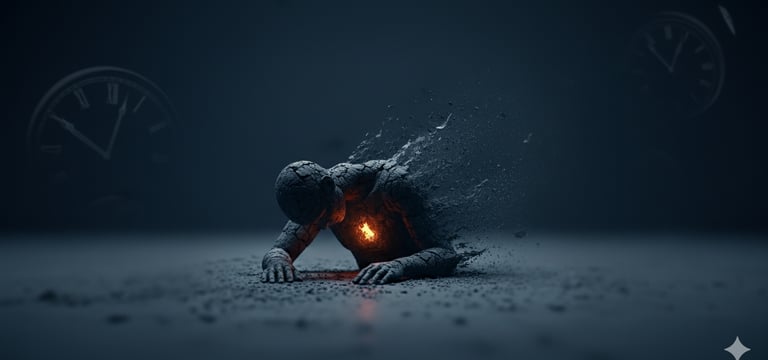BURNOUT, SLEEP & POKER


Hi everyone! Welcome back to my blog.
Today we won’t have a new blog in the Performance 101 series! But we will be delving into a subject that many players encounter yet not everyone knows how to handle: Burnout.
Burnout in Poker is more prevalent than many of us realize. It could stem from variance, a major series, or simply our love for the game, leading players to endure long hours and days of play. This not only impinges on their well-being but also, as a result, impacts their performance.
So, why should we be concerned about this issue? Is it merely because it might lead to losses? No, while that is significant, our mental and physical health is paramount. If we’re in good shape both physically and mentally, achieving peak performance becomes much more feasible.
Burnout is a topic broad enough to fill books, so to keep this post focused, I’ll concentrate on Workload: the number of hours and days we play without adequate rest.
Our daily energy is finite. It requires replenishing, primarily through sleep. But beyond sleep, there are crucial recovery hours; our brain and body can’t sustain energy consumption for extended hours each day.
Thus, the first pillar impacted, which demands our attention when considering our Poker playtime, is Sleep and Recovery.
Let me ask you: how many days, hours, and tables can you handle weekly? What kind of rest is needed to recuperate and sustain this pace over several months? Do you have an answer?
Sadly, few do. Typically, players keep pushing until they hit a wall, only then taking a break. By this point, it’s often too late, with several days of subpar performance already clocked in. Yes, it’s frequently too late, which is why our approach should be proactive rather than reactive.
I get it; Poker demands numerous hours of play and study to stay sharp. But it also demands rest and recovery time.
Now, let’s momentarily zoom in on sleep:
The sleep challenges I commonly observe among players include:
Disrupted sleeping schedules, leading to what’s called social jetlag, where players struggle to maintain consistent sleep patterns, sleeping and waking at varying times each day.
Insufficient sleep: A single night of poor sleep can detrimentally affect cognitive function, emotional irritability, fatigue levels, and even the next night’s sleep quality. Imagine the cumulative effect of consecutive nights of poor sleep.
Timezone challenges: Playing online in Europe, for example, often means nocturnal lifestyles, particularly in winter when sunlight is scarce, impacting both physical and mental health. This issue can be mirrored in live play, where players spend extended hours in casinos without daylight exposure.
These issues culminate in:
Deteriorated quality of life, directly impairing the player’s physical and mental well-being.
Decreased performance at the tables.
Increased emotional irritability.
Concentration difficulties.
Challenges in making sound decisions, both at and away from the table.
Anxiety, stress, and potential depression.
Consequently, players may resort to coping mechanisms that seek immediate pleasure — like pornography, sex, drugs, and/or alcohol — to handle these symptoms.
Elevated stress levels.
Burnout
While this discussion began with Burnout, the ripple effects of the imbalance between play hours and lack of sleep are far-reaching.
Burnout is the endgame here; it’s when we’re utterly drained, and devoid of motivation. A few nights of rest won’t suffice; we need more to recover. Our body and mind have hit their limit.
Burnout involves more than just good sleep, and there are numerous other factors, which I’ll explore in future posts. But for now, to safeguard one of the most crucial yet often overlooked aspects of our physical and mental health, reflect on this: Are you prioritizing your rest hours, or are you sacrificing them to play more?
